How many 'non-religious people' are there in America and what kind of ideology do they have?

In Japan, many people say they are ``non-religious,'' meaning they do not strongly believe in a particular religion, but in the United States, Christianity is the predominant religion. A study conducted in 2023 found that the percentage of non-religious people in the United States who answered 'I have no particular religious beliefs' has increased significantly over the past 10 years, and a survey on the thoughts of such non-religious people The results are shown.
Religious 'Nones' in America: Who They Are and What They Believe | Pew Research Center
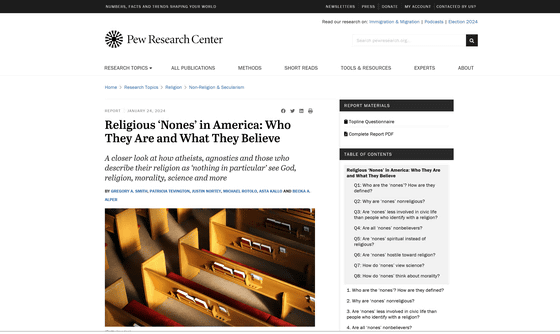
Religious 'Nones' are now the largest single group in the US : NPR
https://www.npr.org/2024/01/24/1226371734/religious-nones-are-now-the-largest-single-group-in-the-us
Pew Research , which is based in Washington, DC and conducts research on people's awareness of issues and opinions in the United States and around the world, released the results of a survey on Americans' religious views in January 2024. The survey was conducted in the form of a questionnaire from July 31st to August 31st, 2023, and 11,201 people responded.
As a result, 3,317 people (approximately 28%) answered that they do not follow any religion. The following is a graph showing changes in the percentage of non-religious people among American adults shown by Pew Research. In 2007, 16% of participants answered that they were not religious, but it can be seen that this percentage is increasing year by year.
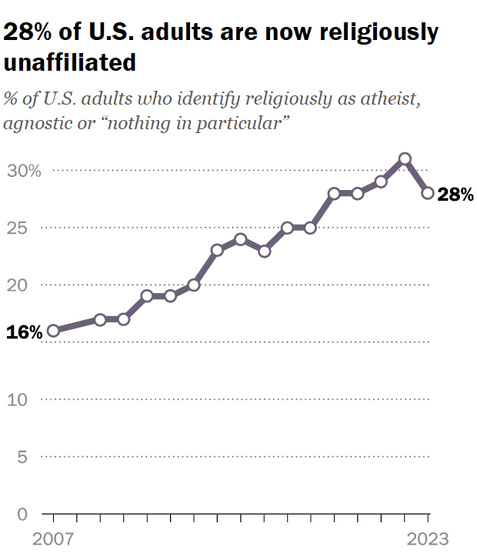
Next, Pew Research answers eight frequently asked questions about 'nonreligious people.'
・1: How is 'non-religious' defined?
In a 2023 survey, of those who answered 'I don't believe in any religion,' about 17% (658) were
According to Pew Research, atheists and agnostics are more likely to be highly educated, while those who say nothing in particular tend to be less educated than the average American adult. . Additionally, 69% of all non-religious people are under the age of 50, and 55% or more of those who believe in a specific religion are over the age of 50. Overall, younger people have a higher proportion of non-religious people. became.
In addition, atheists and agnostics are more likely to be liberal in their political ideology, while those who answered nothing in particular are more likely to be moderate.
・2: Why are you “non-religious”?
When Pew Research asked people who said they were not religious why, two-thirds said they had doubts about religious teachings or did not believe in God. Additionally, a certain number of people pointed out criticism of religious groups and people, with 47% saying ``because I don't like religious groups'' and 30% saying ``I have had bad experiences with religious people.'' .
・3: Are non-religious people not involved in civic life?
People who value religion are more likely to be involved in civic life, such as helping others, volunteering, and voting, while non-religious people are thought to be less likely to do so. In fact, the graph below shows the percentage of volunteers in 2022, voter turnout, and social participation such as contacting elected officials and attending government meetings. The black dots on the graph are non-religious people, and the blue dots are people who believe in some kind of religion, and the percentage of non-religious people is lower in both categories.
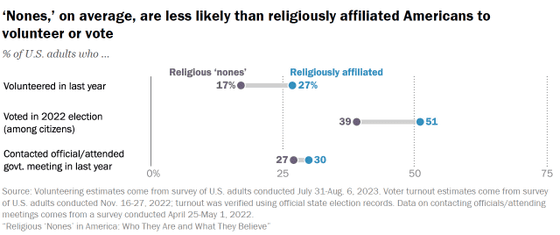
However, while there is a difference of about 10% in volunteer participation rates and voting rates, Pew Research points out that the differences are not that big in several other social participation-related items. In addition, a low level of participation in civic life tends to be seen among non-religious people, and atheists and agnostics are almost the same as religious people.
・4: Do all non-religious people not believe in God?
Although nonreligious people are less likely than religious people to believe in God 'as written in the Bible,' many do believe in God and other higher powers to some degree, according to Pew.・Research has been answered. In a 2023 survey, only 29% of non-religious people denied the idea that ``a higher power or spiritual power exists in the universe.''
・5: Do non-religious people not value spirituality and spirituality other than religion?
Many people consider
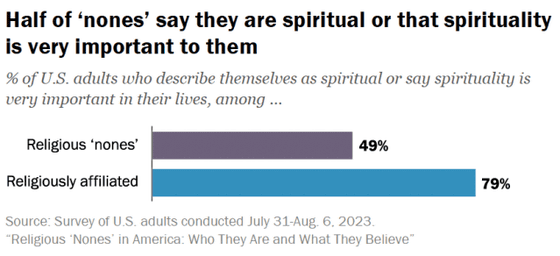
・6: Are non-religious people hostile to religion?
43% of non-religious people say religion causes more harm than good in society. 14% said religion brings more good than harm, while 41% of non-religious people said it has both good and bad aspects. While non-religious people tend not to be hostile to religion overall, some non-religious people have very negative views.
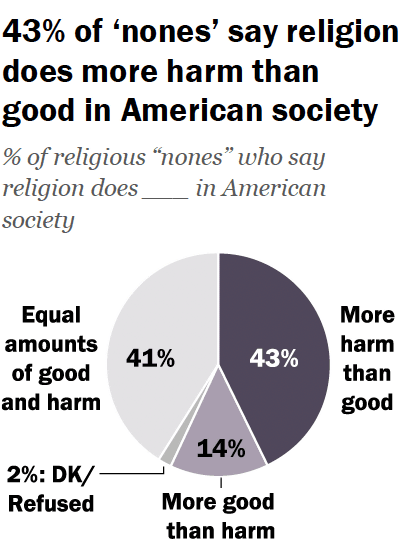
・7: Do non-religious people believe in science?
Some non-religious people deny religion and God and think that ``everything has a scientific explanation,'' but the percentage is 35%. Only 9% of religious people gave the same answer, so the percentage of non-religious people who place importance on science is higher, but even among non-religious people, 63% said, ``Spiritual phenomena that go beyond the natural world I think there is.
・8: How do non-religious people think about morality?
Many people have a moral consciousness based on religion, such as the ideological standard of ``living properly'' and the spirit of respecting others. This does not mean that non-religious people do not have moral values; the majority of non-religious people argue that it is possible to have good moral values without believing in God. .
In response to the results of this survey, Gregory Smith of Pew Research said, ``The increase in the number of non-religious people may have an impact on the lives of Americans.''
Related Posts:
in Note, Posted by log1e_dh







